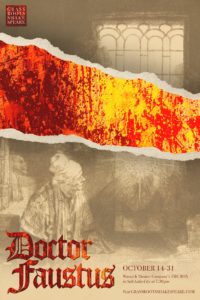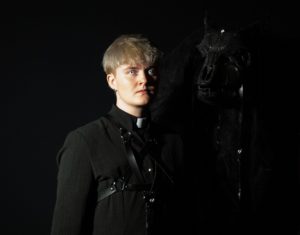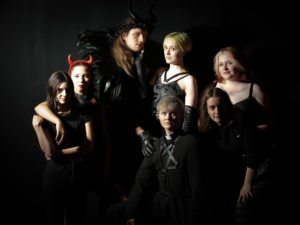SALT LAKE CITY — Anyone who has spent more than a day or two in Utah will come to some basic realizations about the Beehive State: Utahns love winter sports, the Jazz and theatre. As a transplant to Utah of many years, I am a little embarrassed to admit that I have never caught the love of the snow or basketball, but I do fit in with the theatre devotees around me. From national Broadway tours to resident opera companies to ballet and dance studios on every corner, there are myriad ways to feed one’s arts craving. Every school puts on plays, every afterschool program produces musicals, and every city has an arts council. Among such a wealth of artistic options it would seem difficult to stand out, but the Grassroots Shakespeare Company has found a niche all its own.

Grassroots Shakespeare is dedicated to bringing the Bard’s works to life techniques inspired the original practices from Shakespeare’s era. No director has the final say in every creative choice; rather a completely collaborative endeavor from beginning to end. The actors gather, discuss, cast, and block their play much as companies would have done in the days of Elizabeth I and James I. The result is unique and remarkable. As many companies would have in Shakespeare’s day, Grassroots travels from town to town, performing in parks and borrowed spaces, and everyone joins in at every level of production. It is intriguing to watch and gratifying to experience.
Now that their summer season is over, these performers have chosen to produce a play that goes along with the Halloween season, not one of Shakespeare’s this time, but rather his contemporary and friend, Christopher Marlowe. During their lifetimes, Marlowe was arguably more popular and beloved than Shakespeare, and his works have survived as well, although there are not as many, due to his early untimely death because of a bar fight. But Grassroots has chosen to honor him this year with a production of Doctor Faustus. Based on a series of German tales about a scholar who craves knowledge and fame, it is a cautionary tale about the dangers of giving in to hubris, and the inevitability of a final reckoning.
Faustus is tempted by Lucifer’s minions to strike a deal with the devil that will bring him fame and riches and notoriety for 24 years, in exchange for selling his soul at the end of that time. This fable might seem dry and boring, but Grassroots’ treatment is comical and engaging. One part medieval passion play and two parts melodrama, this production sweeps the audience along on the adventure, inviting audience participation, boos and hisses for the villains and cheers for the clowns.

Faustus (played by Nick Crapo) and Mephistophilis (played by J. Attridge) carry the show, as the only two actors who do not play multiple characters. They are strong performers and well cast, developing a solid relationship and creating a believable rapport throughout the evening. My favorite moment was Faustus’s final monologue and scene, in which he has finally realized the cost of his life and the reckoning that is to come. Crapo is a phenomenal actor, bringing nuance and humor and depth to a massive role. Crapo kept the story going, using all his considerable charm and talent to bring Faustus to life. Crapo’s Faustus is a man who should not be likeable and relatable, but somehow is.
The ensemble play their parts with gusto and energy, inhabiting multiple characters with various levels of hilarity and creepiness. Some highlights of the production include the comedic interludes from Robin (played by Laura Wright) and Dick (played by Liza Shoell), the impressive speeches from the Emperor of Germany (played by Sara Goldberg), and performance from Berlyn Johns as the Seven Deadly Sins personified.

Other elements of note in this production are the lighting design (uncredited) and the live music. The lighting design is incredibly effective in delineating various times and places, establishing emotion, and communicating subtext. It is especially impressive in the tiny one room performing space that is The Box Theater. The musicians (Gary Argyle, Brooke Bollick, Chase Schetselaar, and Addison Radle) elevate the story to a completely new level. The live musicians, cello, guitar, violin and percussionist, play almost continually under the action, punctuating funny bits, emotional moments, and scary entrances. The music underscores demons and angels, clowns and students, lovers and enemies. The play would not have been nearly as effective without the music. It is as integral to the storytelling as if it really were a melodrama, informing the emotions and identifying characters.
The performance also embraced many characteristics of medieval passion plays. The Grassroots Shakespeare Company often performs their plays on a temporary wooden platform in a public venue, much akin to theatre in medieval England. The simplicity of the set, with a few levels, two chairs and a cart, all decorated with stacks of books and candles, evoked the ancient days of liturgical drama in the best way, warning the observers of the dangers of pride and the necessity of repentance before death. Especially effective was the real life “hell-mouth” inhabited by demons that emerged to drag Faustus down to hell. It was a brilliant visual moment.
I would strongly recommend the Grassroots Shakespeare Company’s production of Doctor Faustus for anyone looking for an unusual Halloween production. Doctor Faustus is a play that is worth the effort to go see and does not appear on stage in Utah very often. Readers should be aware that the production if is irreverent, edgy, and not recommended for children or those with strong religious sensibilities. If it was a film it would be rated PG-13.
[box]The Grassroots Shakespeare Company production of Doctor Faustus plays Fridays, Saturdays, and Mondays through October 31 at The Box Theatre (124 South 400 West, Salt Lake City). Tickets are $15. For more information, visit facebook.com/GrassrootsShakespeare.[/box]

